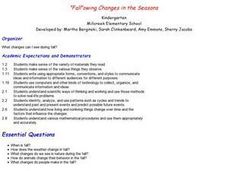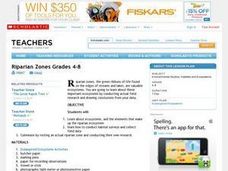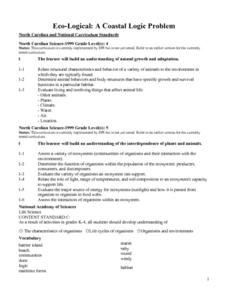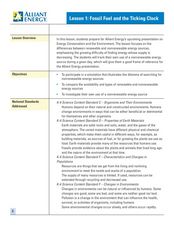Curated OER
Beneficial Bug Scavenger Hunt
Students identify several beneficial insects and spiders, including predators and pollinators. They search an outdoor environment and record numbers and types of beneficial insects and spiders that they discover.
Curated OER
How Do We Make Wise Decisions In Our World?
Third graders participate in a case study and use their problem solving skills to address the solution to a given situation. They consider how to survive in a foreign country, make economic decisions, and determine wise decisions for...
Curated OER
"Fall"owing Changes in the Season
Students create a whole class A-B-"C"eason Book. Each student is responsible for creating a "letter" page relating to changes, adaptations, or other fall concepts. After hard copies of the class ABC books are created, the teachers using...
Curated OER
Where Have All the Endangered Gone?
Students explore animals that are endangered. They choose an endangered animal that they would like to keep from becoming extinct. Students create a persuasive presentation to persuade someone to understand why they feel keeping their...
Curated OER
Plant Life Cycle
Fourth graders explore the plant life cycle. They discuss the sequence of events in the life cycle of the plant and illustrate how the life cycle never ends. Students explore the importance of water, sunlight, and nutrients during the...
Curated OER
What is Biology?
In this biology learning exercise, students review the characteristics of life and the scientific method. This learning exercise has 19 fill in the blank, 6 matching, and 2 short answer questions.
Curated OER
Vermicomposting
Third graders study vermicomposting. In this vermicomposting lesson, 3rd graders prepare to begin a unit on decomposition by constructing a worm bin. Students collect worms to be used later in experiments.
Curated OER
DID YOU HELP CREATE THIS
Students examine whether their actions are positively or negatively affecting organisms and their habitats. They choose an animal to study then create a multimedia presentation including charts and graphs of data logger information and...
Curated OER
Principles of Ecology
In this ecology worksheet, students will fill in a graphic organizer showing the relationship organisms have with their environments and with each other. This includes biotic and abiotic factors, tropic levels, and ecological pyramids....
Curated OER
Is Soil Alive?
Third graders observe soil samples. They then form hypotheses as to whether or not soil is alive. Students read and discuss information about soil and components of soil. They state wheter or not they believe soil is alive and list...
Curated OER
Introduction to Macroinvertebrates
Third graders investigate the world of macroinvertebrates and identify the environmental stressors that threaten their existence. Outdoors, they role-play as stressors and invertebrates, with the intolerant species doing pushups, spins,...
Curated OER
Riparian Zones Grades 4-8
Students examine and analyze the Riparian Zones found on the edges of streams and lakes. They assess why those are such valuable ecosystems and then conduct actual field research on riparian zones and conclude by drawing conclusions from...
Curated OER
Plot Studies
Third graders are introduced to how to properly read a plot map. As a class, they take a field trip to an area surrounding the school and work together in groups to examine small sections of the different environments. To end the...
Curated OER
Habitat Lap Sit
Fourth graders physically form a circle that shows the interconnectedness of the components of a habitat. They form circles and role play the parts of habitats.
Curated OER
Trail Adventure
Students create a trail with numbered specimens. Students complete an accurate and functional interactive trail activity brochure. They complete a web page tree identification guide and interactive identification activity. Students...
Curated OER
Termite Trails
Students observe the behavior of termites and draw conclusions about their behavior. They record data as to termite behavior and recognize elements in the experimental design which must include a hypothesis.
Curated OER
Mud Fossils
Students create their own fossils in an activity using plaster of paris and a variety of objects which can be fossils, e.g. chicken bones, twigs, shells, etc. After making their fossils, they allow them to dry and discuss time and its...
Curated OER
Insect Condominiums
Fourth graders design an insect home using recyclable materials making sure that the organism's needs are met. They study the concepts of niche, habitat and survival requirements.
Curated OER
Eco-Logical: A Coastal Logic Problem
Fourth graders study the characteristics of five coastal communities. They use logic cards and matching activities to identify the proper community for plant and animal species.
Curated OER
Fossil Fuel and the Ticking Clock
Learners study energy sources to learn about fossil fuels and environmental concerns. In this energy sources lesson, students watch demonstrations for various energy examples. Learners find hidden pennies, make a bar graph on their data,...
Curated OER
Sparky's Engineer Activity Book
Students complete their Sparky's Engineer Activity Book. In this engineering lesson, students are guided by their teacher in completing their Sparky's Engineer Activity Book which reviews what engineers make and what tools and materials...
Curated OER
Rikki-Tikki Research
Fourth graders perform a search on mongooses on Internet Explorer and answer research questions.
Curated OER
The Great Spider Debate
Learners study about the survival and hunting strategies of several different kinds of spiders. They also be introduced to scientific classification of spiders and write a brief report about one of the spider families they observe.
Curated OER
Science Trail
Fourth graders explore the concept of ecosystems. In groups, they examine clues to find mystery objects. Once they find the mystery objects, they discuss what ecosystem each comes from. They also look at pond water samples under a...
Other popular searches
- Living and Nonliving Things
- Living vs Nonliving Things
- Living or Nonliving Things
- Living Nonliving Things
- Living/nonliving Things

























